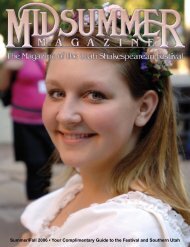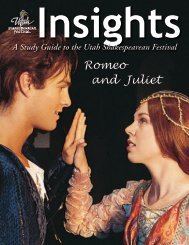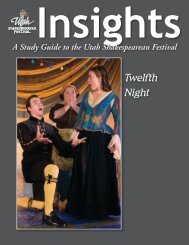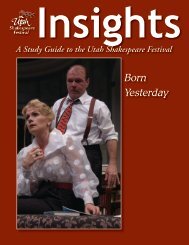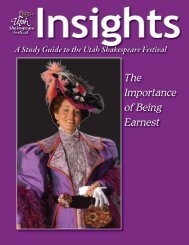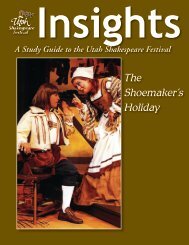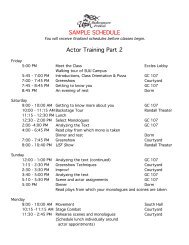The Tempest - Utah Shakespearean Festival
The Tempest - Utah Shakespearean Festival
The Tempest - Utah Shakespearean Festival
Create successful ePaper yourself
Turn your PDF publications into a flip-book with our unique Google optimized e-Paper software.
30<br />
Prospero’s Many Roles<br />
By Ace G. Pilkington and Heidi Madsen<br />
From Insights, 2001<br />
Shakespeare asks in a song from <strong>The</strong> Two Gentlemen of Verona, “Who is Silvia, what is<br />
she?” (<strong>The</strong> Signet Classic Shakespeare [New York: <strong>The</strong> American Library of World Literature,<br />
1964], 4.2.38). <strong>The</strong> central question of <strong>The</strong> <strong>Tempest</strong> may well be, “Who is Prospero, what<br />
is he?” Of course, no one sings it; love songs are usually written to young women, not to<br />
middle-aged wizards, but, nevertheless, many people ask it, and the strange and different<br />
answers they receive make much of the magic of the play. Stephen Orgel says, “More even<br />
than Hamlet, the play tempts us to fill in its blanks, to create a history that will account<br />
for its action, and most of all for its hero” (<strong>The</strong> Oxford Shakespeare: <strong>The</strong> <strong>Tempest</strong> [Oxford:<br />
Oxford University Press, 1987], 11). In Harold Bloom’s words, “Prospero would be a<br />
far apter title than <strong>The</strong> <strong>Tempest</strong>” (Shakespeare: <strong>The</strong> Invention of the Human [New York:<br />
Riverhead Books, 1998], 667).<br />
In his introduction to <strong>The</strong> <strong>Tempest</strong>, Stephen Orgel says, “Prospero is a complex, erratic,<br />
and even contradictory figure” (5). It is a judgement (and a confusion) that is echoed by<br />
actors. John Gielgud, who voiced all the roles in the film Prospero’s Books and was one of the<br />
twentieth century’s most successful stage Prosperos, said he “found it very hard to choose<br />
between” interpretations (Shakespeare—Hit Or Miss? [London: Sidgwick & Jackson, 1991],<br />
110). Prospero has been taken as a representation of King James I, of Queen Elizabeth I,<br />
and, of course, of Shakespeare himself. Indeed, Prospero seems to be so many things that<br />
it is easy to sympathize with Harold Bloom’s angry exclusion of at least a few of them,<br />
“Marxists, multiculturalists, feminists, nouveau historicists—the usual suspects—know their<br />
causes but not Shakespeare’s plays” (662).<br />
Clearly, Prospero is the rightful duke of Milan, deposed by his wicked brother, Antonio.<br />
He is the enemy of Alonso, king of Naples, who helped to depose him, and the friend of<br />
Gonzalo, who gave him books for his exile. Prospero is a wizard of great power who controls<br />
a host of spirits, including Ariel, a spirit of air and fire, and Caliban, a monster of<br />
earth and water. Prospero is the father of Miranda, and her teacher. He is a politician who<br />
schemes to regain his place as duke and a matchmaker who plans to marry his daughter<br />
to Prince Ferdinand of Naples, son of Alonso. He is a liberator who released Ariel from a<br />
magical prison, and a judge who sentenced Caliban to a term of slavery for the attempted<br />
rape of Miranda. Prospero looks like a colonizing European who holds all the creatures of a<br />
strange new world in thrall, but he is far more benevolent and just than those drunken (and<br />
very funny) louts Stephano and Trinculo, who change from servants to masters (and back<br />
again) at the spin of a bottle. In the end, Prospero leaves the island, if not as he first found<br />
it, at least to its own devices and those of its inhabitants.<br />
Prospero is a sort of surrogate playwright, who takes over Shakespeare’s job of shaping<br />
the plot. He is an actor in various scenes of his own devising, and he is an expert stage<br />
manager, who brings his cast of characters in on cue. As Alvin Kernan says, “In the play,<br />
Prospero’s magic is the magic of the theater, his power the theatrical one of staging illusions<br />
that deeply move and teach his audience” (Shakespeare, <strong>The</strong> King’s Playwright [New<br />
Haven: Yale University Press, 1995], 161). Like the Duke in Measure for Measure, Prospero<br />
learns as he teaches and struggles to refashion his internal landscape as he remakes the<br />
island. “Within Prospero himself, moreover, we glimpse intermittently the struggle, or<br />
internal tempest, between the humane impulse towards mercy and the instinctive appetite<br />
for revenge, the Ariel and Caliban of which his own—and our—nature consists” (John<br />
<strong>Utah</strong> <strong>Shakespearean</strong> <strong>Festival</strong><br />
351 West Center Street • Cedar City, <strong>Utah</strong> 84720 • 435-586-7880



